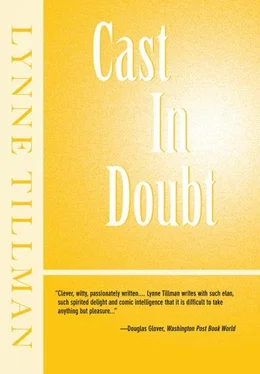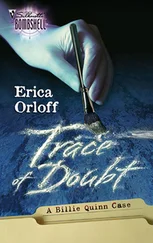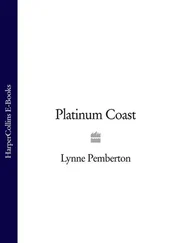A relatively long silence is broken by John’s opening his surprisingly violet eyes, eyes like Liz Taylor’s or those of the teen idol Ricky Nelson, whom Gwen adored years ago, for reasons I couldn’t fathom, except that he was, according to her, the perfect white boy, the kind of boy she’d love to spoil and ruin, who would have bored her to death, but she could have embraced him and imagined “Ozzie and Harriet.” And like the television program, which Gwen told me about, based on the wholly wholesome American family, Ricky exuded a false but beguiling innocence. Gwen would have loved to mess him up, as she put it. I might want to adopt him rather than mess him up.
Horace, Horace, Alicia says, repeating my name several times, I believe, because I am absorbed in remembering Gwen and me at a Cambridge tea, where she announced to a frail, terribly white woman that she, Gwen, was the product of rape, of miscegenation — Gwen and I were drinking not tea but martinis, in teacups. Gwen hardly ever mentioned her race, so it was amusing and startling, and she was a mere slip of a girl then.
Horace, Alicia says, this is John.
John languidly waves to me and does so with such sweetness that I am instantly under his spell. His thick long lashes fairly sweep the soft skin under his violet eyes. I can see why Helen loved him, if she ever did. There’s something wicked and winsome about him. An Irish beauty, I should think, Catholic, unalterably opposed to abortion, I surmise, as if I were my detective Stan Green. John’s smile is akin to Vivien Leigh’s. I am the frog prince, I want to say, and you are Prince Charming. Instead I say, Helen asked me to come see you, to see how you were doing. At this he grins and Alicia stamps her foot, a short but vivid thump. She did? John asks. I nod several times, my head rolling on its base. I’m very tired, he says. Tell her to come herself, man, okay? He adds, Tell her she can have my ax. John points to the opposite side of the room where a long black case with stickers on it is leaning against a not very antiseptic white wall. Helen can have his ax; I make a mental note of this. From the shape of the case and some of its stickers — New York Dolls; Live Fast, Die Young — it appears that an ax is a guitar, and John must be a rock and roller, perhaps a punk. All quite in keeping with Helen. She may have met him at a bar, Max’s perhaps, when he was playing. She may even have been a groupie. Gwen once wrote me a long letter about several she knew who were fascinated with her. They were wild girls, she wrote, who thought she could instruct them in mischief.
John stirs again. His startling eyes gaze on me with an intensity that might consume all of me. I return his look and wonder, Why not take all of me? He marshals his strength and rests on his elbows. Then he speaks quite deliberately. Tell her I’m okay. Not like her sister, man.
After this rather compelling confession, he closes his eyes and shakes his head from side to side. His eyes still closed, he is about to speak again. Alicia and I are literally hanging, suspended, on his every word. I watch his eyes, hoping they’ll open again, as a curtain might for the second act of a play. I’m not sure what Alicia is watching, perhaps his soft wet mouth. He speaks: Nah, it’s not like that. Don’t tell her anything. Just tell her I’m okay. That’s all. She can visit if she wants. It’s cool.
Alicia fusses over him, making cooing noises. She smoothes John’s hair, then turns to me and peremptorily commands, Horace, you’d better leave now, which I do, as if being dismissed by a disapproving teacher. I can see before me Mrs. Wheeler, my fourth-grade teacher, who did disapprove of me. She is starched and bent over, the weight of her grand bosom too much for her body to hold; it seems to tip her toward the floor. Her pearl-handled cane taps the floor just next to my nine-year-old feet. It’s a distinctly unpleasant and memorable sound. “Horace, you may go. Let us hope this never happens again.” Will she tell my father? I wondered fearfully. What did I do, what was I, what am I, guilty of? I used to be able to see Mrs. Wheeler’s face clearly, but now Alicia’s fills that vague space. Alicia’s bosom is of an average size, and she stands straight as a board, being, in addition to an opera singer and reasonably accomplished pianist, a practitioner of yoga.
I float away from the room, exiting a dream. I float out the hospital entranceway, past the clerk to whom I gaily, if not idiotically, call out Yá sou, then pass by once more the flowering shrubs, their pink blossoms an incitement to the heat that means to kill them. But to me they are a natural déjà vu.
Not like her sister, John said. He delivered a mixed message, and an extremely provocative one. Her sister, not like her sister. Helen has never mentioned a sister. And he is not like her, not like that. Does this mean that Helen’s sister tried to kill herself? Or did she succeed?
Helen’s sister may have been or was a suicide. Perhaps Helen’s twin sister was a suicide. Helen doubled. There may have been two just like her, sharing a psyche. Two Helens and one John. How differently I am drawn to these young people, these children. They are children but children are not innocent. John, I could mother and father, could imagine stroking and petting, even kissing — yes, that soft mouth, Gwen’s perfect boring white boy. But Helen — I love her at a distance, love her platonically. I dare not fondle even her abstraction. My interest is, how shall I put it, more scientific, perhaps. She is of a different tribe and immensely attractive, and it’s true that once or twice I imagined kissing her, but only on her forehead. I am avuncular with her. Or try to be. She is like me, I suspect or want to believe, somewhere deep inside her, but her resemblance to me exists below the level of my consciousness and hers. Thoughts like these are why Roger thinks I’m getting senile.
How shall I tell Helen about John’s ax? I don’t see that I can even mention visiting John, unless I lay the blame entirely upon Alicia. It’s always wonderful that what first appears to be a liability — such as Alicia’s presence in the hospital — can be turned, in a nonce, to an advantage. It’s the obvious course. I’ll mention to Helen that Alicia and I went for a walk, and she invited me with her to see a friend in the hospital. John. I had no idea what she was up to, or who he was, and then, when I found myself in his hospital room, in the natural course of things it came out that I was Helen’s friend, and so on. It all just came out — and John said what he did about the ax, and her sister; but ought I venture to bring her sister into the first conversation I hold with Helen about John? Tricky. It’s Alicia’s fault, I’ll insist to her like a schoolboy. Helen must know Alicia dislikes her. She doesn’t care a jot for Alicia, I’m certain of that, and Helen knows she can depend upon me. I care about her.
Frankly, I don’t want to tell Helen any of this, as I am vulnerable to the worst sort of silly charge — being a busybody and a snoop, as well as disregarding the terms of our relationship which I tacitly agreed to that day in my car. In my defense I don’t know why I felt compelled to visit John, except that I am often a trifle bored, and I try, in my own way, to make life a bit more interesting, more inventive, more like fiction than it might otherwise be — that is, I consciously do something that a character in one of my stories might, to entertain myself and my readers. It is, one might respond, my rationale. With age I do this rather more frequently.
I’d like to think this is what makes me a storyteller. My mother was a wonderful fabulist and even today I miss the sound of her voice as she turned one of Aunt Grace’s visits with her into an intriguing and fantastic event, one full of danger and diversion. As when she told the story of one of her sisters visiting Boston when automobiles were still new to the metropolis. I ought not to have turned against my mother, especially when I remember those bedtime tales that were, in a way, our secret bond. I’m sure my father remained unaware of his wife’s late-night confabulations. Sometimes I could barely fall asleep, thinking about all the many exciting events my mother had related. It was she who told me the stories of our family’s history, which I know now were part fact, part imagination or desire. She ought to have been a writer. But unlike Jane Austen she didn’t put pen to paper after her father and sisters left the room or after she finished her housework, when then, and then only, she had a moment of solitude, a moment to herself.
Читать дальше












